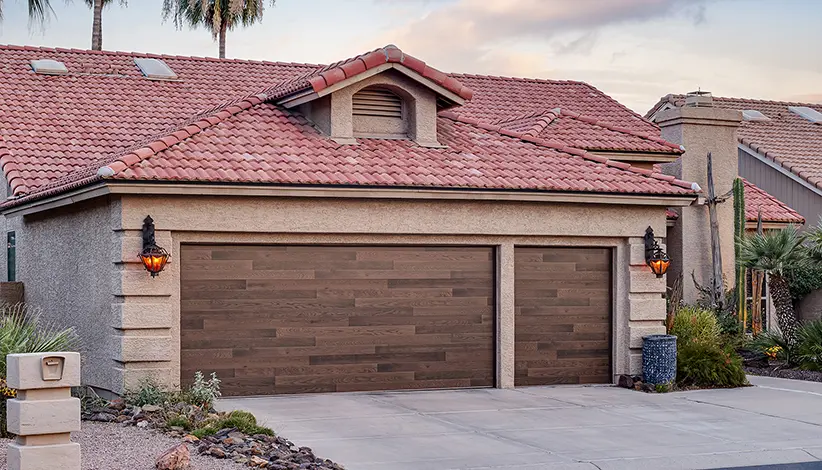How to Choose the Right Garage Door for Your Climate

When selecting a garage door, climate plays a crucial role in determining longevity and insulation needs. Extreme temperatures, humidity, and weather conditions can impact a garage door's operation and durability. For example, in colder climates, heavily insulated doors prevent heat loss, while in warmer climates, doors with UV-resistant materials deter sun damage. Understanding your local climate's challenges is key to choosing the right garage door for your needs. Here we’ll explore how to assess your climate and select a garage door that provides the necessary insulation, durability, and performance.
From temperature extremes, humidity levels, wind resistance, snow load, rainfall, and sun exposure, understanding your local climate is important when selecting a new garage door. Here are a few things to consider:
Temperature Extremes
In cold climates, insulation is key to preventing heat loss and keeping your garage warm. Look for doors with a high R-value, which measures insulation's ability to resist heat flow. Several of Clopay's insulated models feature a high R-value, effectively maintaining your garage's temperature while reducing energy costs. Conversely, in hot climates, ventilation is essential to prevent heat buildup, promote airflow, and keep your garage cool.
Humidity Levels
In humid environments, such as coastal areas, material choice is essential to prevent warping. Fiberglass, steel, and other water-resistant materials outperform untreated wood in these conditions. Clopay's durable finishes and rust-resistant hardware ensure their garage doors excel in humid climates with minimal maintenance.
Wind Resistance
For hurricane-prone areas, impact-rated doors are designed to withstand high winds and flying debris during storms. Clopay offers specific models with reinforcement, ensuring your garage remains safe and secure throughout hurricane season. These doors have been tested to meet stringent windload building codes, providing peace of mind for homeowners in these regions.
Snow Load
In snowy regions, you’ll need to consider the structural integrity of your garage door under heavy snow accumulation. Look for doors with high strength ratings to ensure they can handle the weight of snow.
Amount of Rain
In areas with heavy rainfall, waterproofing features are necessary to prevent water from compromising the door's structural integrity. Clopay offers options with advanced weather sealing and rust-resistant materials, to help garage doors withstand moisture and provide long-lasting durability.
Sun Exposure
In sunny climates, UV-resistant finishes are essential to prevent fading and maintain the door's aesthetics. Some Clopay models come with this protective coating and will help the door look great for years to come. These finishes resist cracking and fading, providing a beautiful appearance throughout the door's lifespan.
Energy Efficiency Ratings
Understanding energy efficiency ratings is crucial for minimizing your energy costs. Various materials used in garage door construction impact energy efficiency. For example, insulated doors reduce heat transfer, decreasing the energy needed for heating and cooling your garage. Clopay offers a range of energy-efficient models, helping you save on energy costs year-round. By selecting a door with a high R-value and energy-efficient materials, you can reduce your carbon footprint and lower your energy bills.
Different garage door materials offer varying levels of insulation, durability, and resistance to environmental factors. Understanding the strengths of each material and how they perform in different climates allows you to make an informed decision.
Cold Climates
In cold climates, insulation is key to preventing heat loss and keeping your garage warm. Insulated steel and fiberglass are recommended due to their thermal properties. These materials effectively retain warmth indoors, reducing the need for additional heating sources beyond the natural insulation provided by the door itself. Clopay's insulated models feature a high R-value, measuring insulation's ability to resist heat flow. These doors maintain your garage's temperature while minimizing energy costs, making them ideal for colder regions.
Hot Climates
In hot climates, lightweight and durable materials are essential. Aluminum and vinyl are recommended as they resist warping under extreme heat exposure. These materials also withstand moisture damage frequently encountered during summer storms.
Humid Climates
In humid climates, you’ll need a garage door made of materials resistant to mold and mildew. Clopay's composite models resist warping and rotting and feature durable finishes and rust-resistant components, ensuring they outperform traditional wood in coastal and humid areas.
Windy Areas/Hurricane Zones
For hurricane-prone areas, reinforced materials are necessary to withstand high winds. Reinforced steel options are designed specifically to maintain safety and security throughout storms. Clopay offers impact-rated doors with reinforced structures, meeting stringent windload building codes. These doors have been tested to ensure they remain intact during hurricane season.
Snow-Prone Regions
In snowy regions, heavy-duty insulated doors are preferred to maintain strength under big snow loads. Clopay's heavily insulated models ensure reliable operation even in the harshest winter months. These doors feature a high R-value and advanced weather sealing to prevent cold air infiltration and snow intrusion.
Sunny Regions
In sunny climates, UV-resistant finishes are essential to prevent color fading. Clopay models with protective coatings resist cracking and fading, maintaining the door's aesthetics throughout its lifespan with minimal maintenance. By protecting the door from the sun's harmful rays, homeowners can enjoy a beautiful appearance without the need for frequent repainting or staining.
Of course, it depends on your local climate when selecting a garage door to ensure optimal performance, longevity, and energy efficiency. Insulated doors excel in cold climates, preventing heat loss and reducing energy costs. In hot climates, lightweight and ventilated doors keep your garage cool. In humid or coastal areas, materials resistant to warping and rusting provide long-lasting performance. In windy or snowy regions, reinforced and heavily insulated doors maintain safety and security. Clopay offers a range of solutions for various environmental conditions. Whether you live in an area with temperature extremes, high humidity, strong winds, heavy snowfall, abundant rainfall, or intense sun exposure, there's a Clopay garage door to fit your climate.
Reach out to your local dealer to get started.

